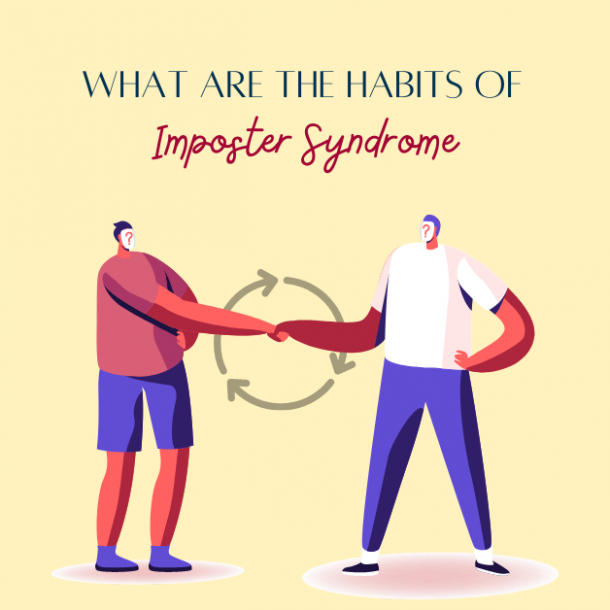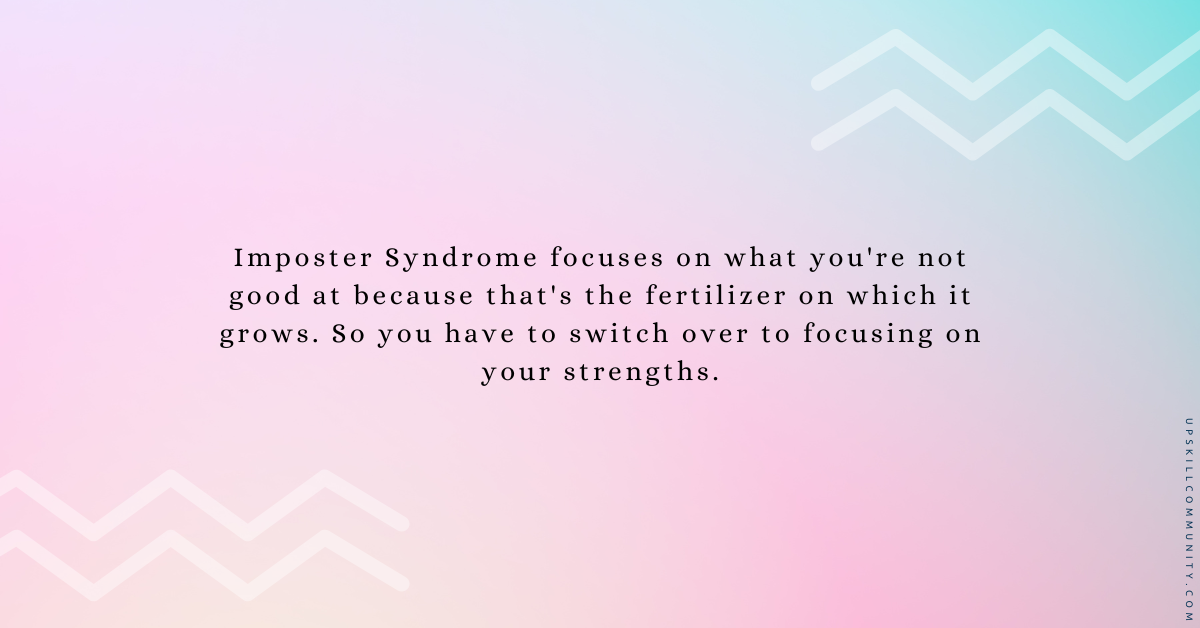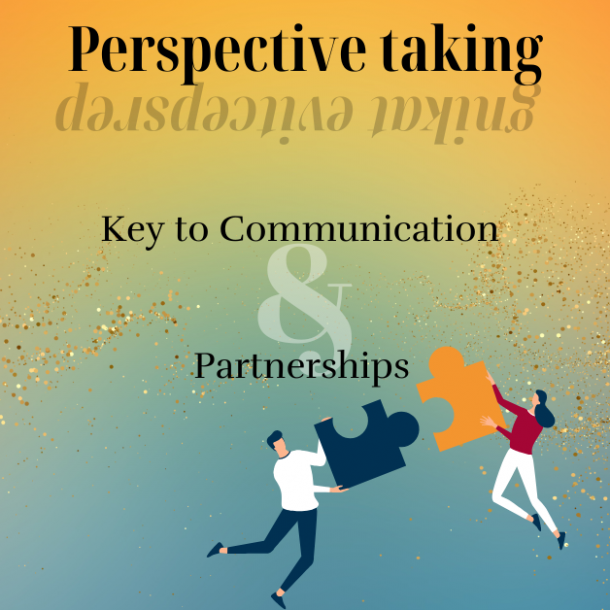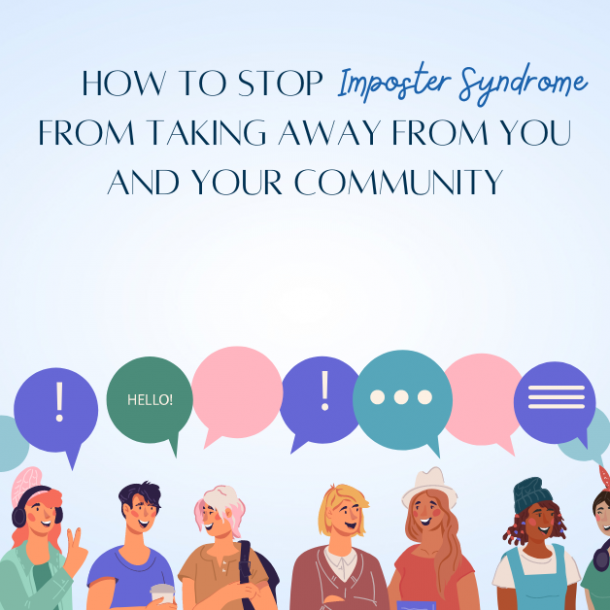
UpSkill: Shift to focusing on your strengths to combat imposter syndrome
Do you ever feel the need to be perfect, to show up in an extra special way?
Does low self-assessment haunt you. Do you feel guilty when you’re successful? Guilty of your accomplishments? Do you ever find yourself putting yourself down?
Do you beat up on yourself for making simple mistakes? The kind of mistakes that everybody else makes and ignores. Do you find self-doubt and low self esteem seeping into your life? Do you give credit to others or to luck when you achieve something?
Or do you give away your ideas? Or give others credit for your own contributions? Do you find yourself sensitive to feedback? Are you very uncomfortable receiving constructive feedback? Do you ever find yourself feeling uncomfortable with your own title, your position or your introduction? Not really wanting anyone to call out what you do or call out your position or say who you are? You may be suffering from imposter syndrome if any of these apply to you.
Imposter syndrome interferes with our psychological well-being. With our sense of belonging, with our health, with our happiness, with our joy. The literature talks about this. And so we want to make sure we have a good understanding of what imposter syndrome is. How we identify it, how we perpetuate it and now more than ever, how we can remove it from our lives in a meaningful way. Because it creates self-doubt anxiety. It affects our ability to go after reasonable opportunities. And the more than anything, it just affects our ability to be our best self.
In this episode we look at the strategies that you may need to think about, and habits that you may need to develop in order to keep this imposture at bay.
First things first. You are not alone. Seven in 10 people experience this at some point in their lives. 25 to 35% of high achievers experienced this more persistently. And so you are definitely not alone. That should help you to feel like less of an imposture.
Start by knowing the feelings that you’re experiencing are not just inside of your head or not just inside of you because you think you’re an imposter. There is a society of people who feel that way at some point or another.
We’re going to dive into some strategists to help you.
First let’s explore the mindset. It’s important for you to enter this space with the mindset, knowing that you are not perfect. That was even hard for me to say. You are not perfect. You can’t know everything. You can’t do everything. You can’t be everything and you will not be all things to all people. So give yourself wiggle room, give yourself space to make mistakes. Space to mess some things up, space to start over.
Give yourself room and scope to make mistakes. You’re going to make mistakes. And that actually is a good thing because it makes you not an imposter. That makes you fit in with everybody else who makes mistakes.
When you give yourself that space and that scope to make mistakes, you are making it clear that you know that you’re not perfect. You also make it clear that imperfection is OK. You’re owning your imperfection and that makes you perfectly imperfect.
In episode 41, I touched on the mindset of deficiency that we take into our work and into our lives in general. That mindset of deficiency forces us to focus on all the things we do not have. All the things we cannot do. In that mindset, we rarely focus on our strengths.
We have the things we have in place, like health. Like the ability to speak, like the ability to listen, like the ability to process this information and make it mean something to you.
Those are some things that we have. The ability to take this information and do something with it. The ability to go to work, the ability to be a part of a family, the ability to serve, to be a part of something bigger than ourselves.
We are not measuring what we’re able to. Not measuring our unique contributions to the conversations. To the projects, to the organizations, to our communities, to our world. We have to be able to shift from that deficiency mindset to our strengths mindset, because we rarely stop to think.

“What are we really good at?”
And that’s what the imposture wants. It wants you to focus on what you’re not good at because that’s the fertilizer on which it grows. So you have to switch over to focusing on your strengths. When you start focusing on your strengths, it’s almost like you’re a weed killer. You’re getting rid of the imposter because it does not survive when we’re focused on our strengths. So this is very, very important.
You can go back to episode 41 and have a look at that. I already covered the importance of changing our mindset from one of deficiency to one of focusing on our strengths. These are important habits of the mind that we need to cultivate. We need to focus on what we want more off. So I’m encouraging you focus on what you want more of. And that means starting by thinking about the goal. What’s the goal. When, you know what the goal is and you put in the effort to achieve the goal, it’s easy to measure that you have achieved the goal.
We have to convince ourselves from beforehand that the goal is a reasonable goal. And that achieving this goal is a reasonable accomplishment. And so that when we achieve the goal we can write that down in our accomplishment log because we have already vetted this. If it is a reasonable goal, then we put in the reasonable effort to achieve it. Then it’s a reasonable accomplishment worthy of our time. Worthy for us to feel gratitude for, and worthy of rewarding ourselves. And if nothing else, for us to pause and experience the positive feelings that come from that accomplishment.
When we’re enjoying positive feelings that come from our accomplishment there is no room for the imposture to come in. And so practicing gratitude for achieving our goals is a strategy that can help to squeeze the imposture out. But not just the very big goals, like buying that house, buying that car landing or the new job. But the smaller goals too, like setting an alarm and saying, “This is when I’m going to wake up every day and I’m going to dedicate 15 minutes to my accomplishment log, achieving that and making a note.” I have done my accomplishment log for 30 days in a row. That’s worth celebrating. That’s worth feeling positive about.
When we take time to experience these positive feelings there is no room for the negative feelings that the imposture brings into our lives. And so we have to make sure we are expressing gratitude. And we’re focusing on where we want to go.
It’s important for you to remember that imposture syndrome is about feelings. It’s not about facts. And so you can produce an opposite feeling. That’s what this is about about: a feeling that our mind allows us to feel. It’s a perception. And it’s run through a negative lens.
And so we can change the lens and shine it on some positive attributes, some positive behaviours, some positive habits of the mind that we’re developing. And embrace the positive feelings. That will help the imposter stay away. And now the strategy is to develop positive stories that offset the negative stories.
When the imposter says you didn’t belong in that conversation, how did you get invited to that call? You have to say, I have earned in my space in the meeting. I have worked really hard. I would not be invited into this meeting if I had not earned a spot in the meeting.
You have to create that positive story to knock out the negative stories that this imposture has been telling you for a very long time. Some of the stories that the imposter is telling us come from family members and friends who started telling us negative stories in childhood. We then adopt their stories. And then we internalize these stories and we’ve been repeating and rewinding and replaying these negative stories stories, and they continue to harm us.
The negative stories harm us in our relationships, in our work and our ability to serve the community, and certainly in our own well-being. And so we need to pause. Identify some of those stories. Start with one, start with one that you play all the time. You know, that negative go-to story. Start with that one. And trace its beginnings. Where did this story come from? Is this one that you made up or was this one projected on you? Either way. Remember those stories affect our feelings. What story can I create today that can help me to offset the negativity that’s coming from that story?
This is something we’re going to have to do one area at a time, one characteristic at a time, one story at a time. But as long as we’re committed to removing this negative imposture out of our world, one step at a time is all we need. And it starts with one habit of the mind to offset the negative deficiency model that we’ve been socialized to use.



